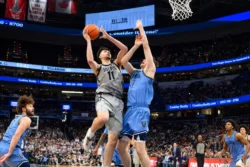There is no better time in the sports calendar to kick back for an all-day television vigil than the opening rounds of the NCAA men’s basketball tournament. But year in and year out, the weekend that should be the sports fan’s dream is shrouded by frustration. This frustration is not the result of watching one’s bracket fall apart with each game, but by the March Madness monopoly of CBS.
Picture the perfect-world scenario: you’ve made the not-so-difficult decision to skip class so as not to miss a single minute of the Madness. With a comfortable spot on the couch with snacks and drinks within reach, you deftly navigate from ESPN to its affiliates, ESPN2 and ABC. With three channels at your disposal, the action is truly constant, and commercials and blowouts can be avoided with the push of a button.
Now consider the one-channel reality: a dangerous 12-seed is threatening to send the five home early. The game is down to the wire, but you only know this from the small score-box buried in the upper-corner of the screen. As a sports fan, you have every right to be live on the scene in case of any last-second drama or heroics. Instead, you are stuck on CBS, watching an unbeatable number one-seed pound a fledgling 16 by 30 points. Or worse, the network forces you to endure the same commercials over and over again instead of switching to another game during a timeout. On a day for couch potatoes to perfect their craft, this is nothing short of sports blasphemy.
To be fair, CBS has improved over the last few years. In this year’s opening rounds, the network was much quicker to switch from landslide victories to closer contests. CBS has also introduced a computer initiative called March Madness On Demand (MMOD). With MMOD, the more technically savvy viewers can watch live games on their computers as they watch others on television. However, the volume of people attempting to access the site in the opening rounds clogged the system and made it difficult for many to actually see the games. Those who could not get through were made to stand in a virtual line as their teams played on without them.
Every year, college football’s BCS takes a pounding from critics who disagree with the way the national champion is decided. March brings with it the refreshing concept of a championship tournament, where 64 teams are given a shot at ultimate glory. It is as close to a perfect system as we have in sports, and fans deserve perfect coverage. Despite this year’s innovation, CBS is still not worthy of the NCAA Tournament.





